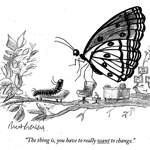Do you know what happens inside a cocoon? Thanks to medical sonography capable of looking into bodies, it is now known that the process of becoming a butterfly involves a complete meltdown. Internal structures rearrange themselves and ultimately, a beautiful creature emerges, the product of metamorphosis.
Certainly, infertility can be said to evoke feelings of meltdown. The diagnosis, the disruption to work, marriage and friendships, the isolation, the surgeries, the medications, the decisions, the battles with insurance companies and battles with your own emotions – these things and more put endless challenges in front of you. Then, enter the holidays, the season to be jolly. Good grief!
Perhaps you do not know that because the holidays can raise the level of awareness of emotional upset, the opportunity for metamorphosis as an individual or couple can be imminent.
We could call this season the opportunity for emotional sonography – monitoring the meltdown and keeping your sights on the emergence of something better. If you are willing to look inside, you can see how internal, emotional “structures” can shift.
The holidays loom large because the world conspires to expect everyone, you included, to be as effervescent as champagne when you feel like flat club soda. Keep in mind that infertility in general and the holidays in particular need to be approached the same way one would approach eating an elephant: one bite at a time. Whatever feels overwhelming can be broken down into manageable pieces.
1. Allow yourself an actual meltdown. Maybe you do not know that the stress of infertility has been measured on a par with the stress experienced by people who have received a diagnosis of cancer or HIV/AIDS.* Tears can be very therapeutic as a mechanism that neutralizes the buildup of pressure. There is an expression in my field: Loose your mind but come to your senses. Some people feel if they melt down, it is tantamount to loosing their mind. Melting down is appropriate to the circumstances. Sometimes, the best thing any of us can do is to get relief by letting loose when the world seems to be expecting holiday gaiety. Letting it all hang out can facilitate regrouping – like what happens inside the cocoon. Not all tears are about falling apart. Emptying the burden of your pain is a way of coming together.
2. Participate. I’ve seen many couples who over the years have been able to pull it together and actually enjoy the festivities. Emotional sonography under these circumstances is a way to stay finely tuned to yourself and to one another. Make a pact with each other to observe what is going on in the “cocoon” of the family and in your own internal cocoons as well. Anticipates pitfalls. Have a signal if one of you needs to have a powwow or needs to leave a party. Be sure to debrief after each event, too. For this I would recommend that when you come home each of you could spend 10 – 20 minutes writing down all of the blips on the screen from the day. It would be important to remain as objective as possible, listing the facts without the emotions. If need be, write down facts and emotions and then rewrite the list, leaving the emotions out. Writing rather than speaking facilitates objectivity. Then compare notes. The built -in opportunity to morph comes by tuning in to what is going on within the cocoon, both yours and the extended family’s.
3. Exercise your right to not participate. This may cause feathers to be ruffled. Sometimes family traditions seem set in cement. It becomes particularly sticky if people do not know that you’re in a fertility battle and you’re unwilling to go public. But, it is important to put yourselves first and claim the right to decide as a unit what’s best for you. The opportunity exists to morph from marching to the family beat to establishing a set of rules or compromises of your own and insisting that the family respect your choice. What if as a couple you do not agree? Here, too, I recommend spilling your feelings onto a piece of paper separately and then exchanging ideas with as much objectivity as possible. These suggestions are obviously simplified. Be forewarned that when we make changes, it is most common to feel confused and emotional due to the unfamiliarity of the change. The process of change can feel like riding a bucking bronco. It is a common mistake to resume that nothing has changed when it is the confusion of change itself that is uncomfortable. For instance, if saying no to family induces feelings of guilt, if the guilt is rational and neutralize the guilt by accessing feelings of entitlement. There is a huge opportunity here to integrate feelings of self – esteem on a new level.
That makes it easier to stay steady. And the opportunity to morph with any of these approaches lies in the opportunity to strengthen the partnership. Especially if you feel near meltdown, can you rearrange your internal processes, even in small ways, and emerge a butterfly? The Chinese character for the word crisis is a combination of the words for danger and opportunity. And facing the danger of any crisis is always an opportunity for growth and change.
*Domar, AD, Zuttermeister PC, Friedman R: T he psychological impact of infertility: A comparison with patients with other medical conditions. Journal of Psychosomatic Obstetrics and Gynecology 14:45
–
52, 1993.
©Helen Adrienne 2006







